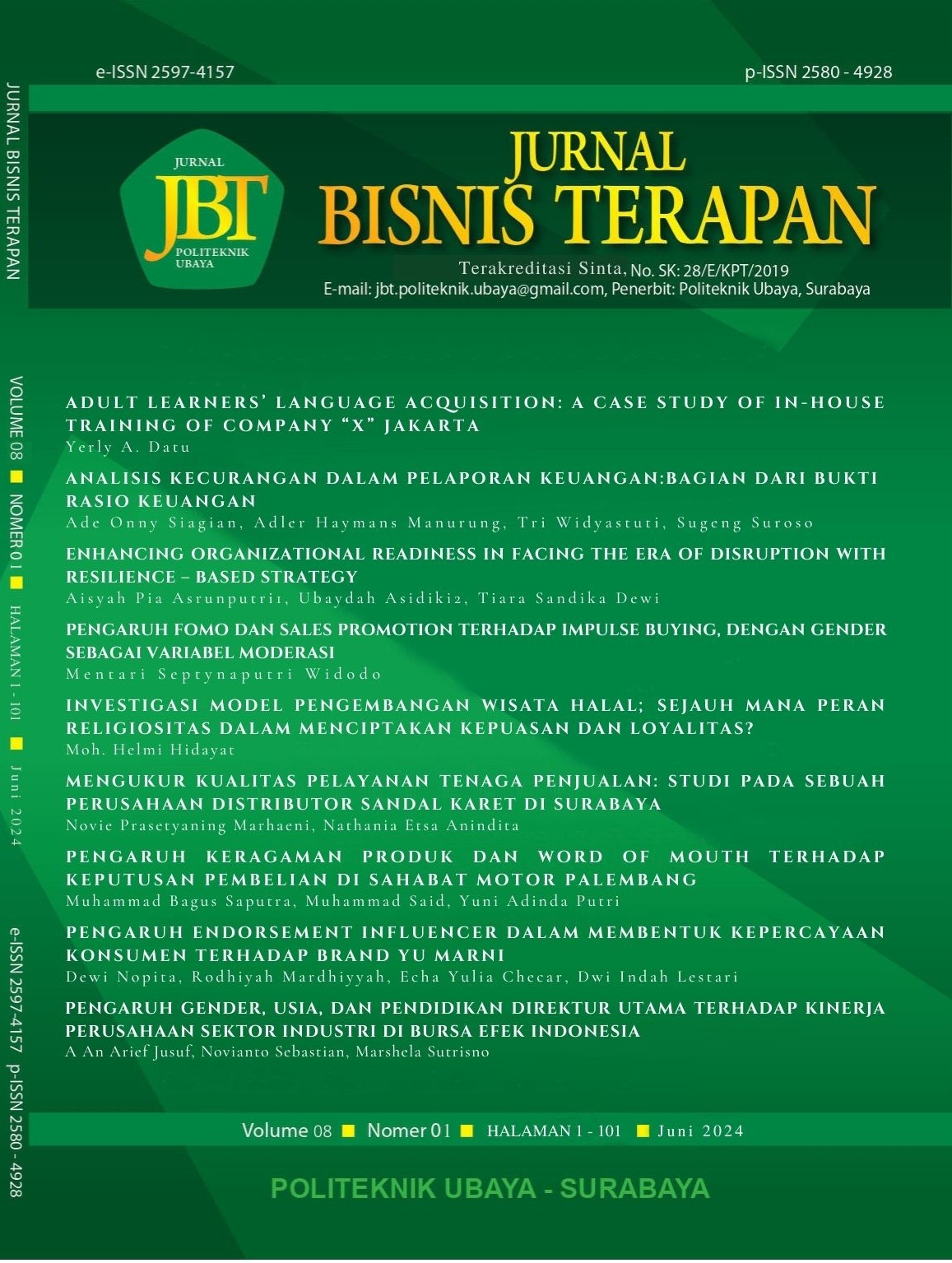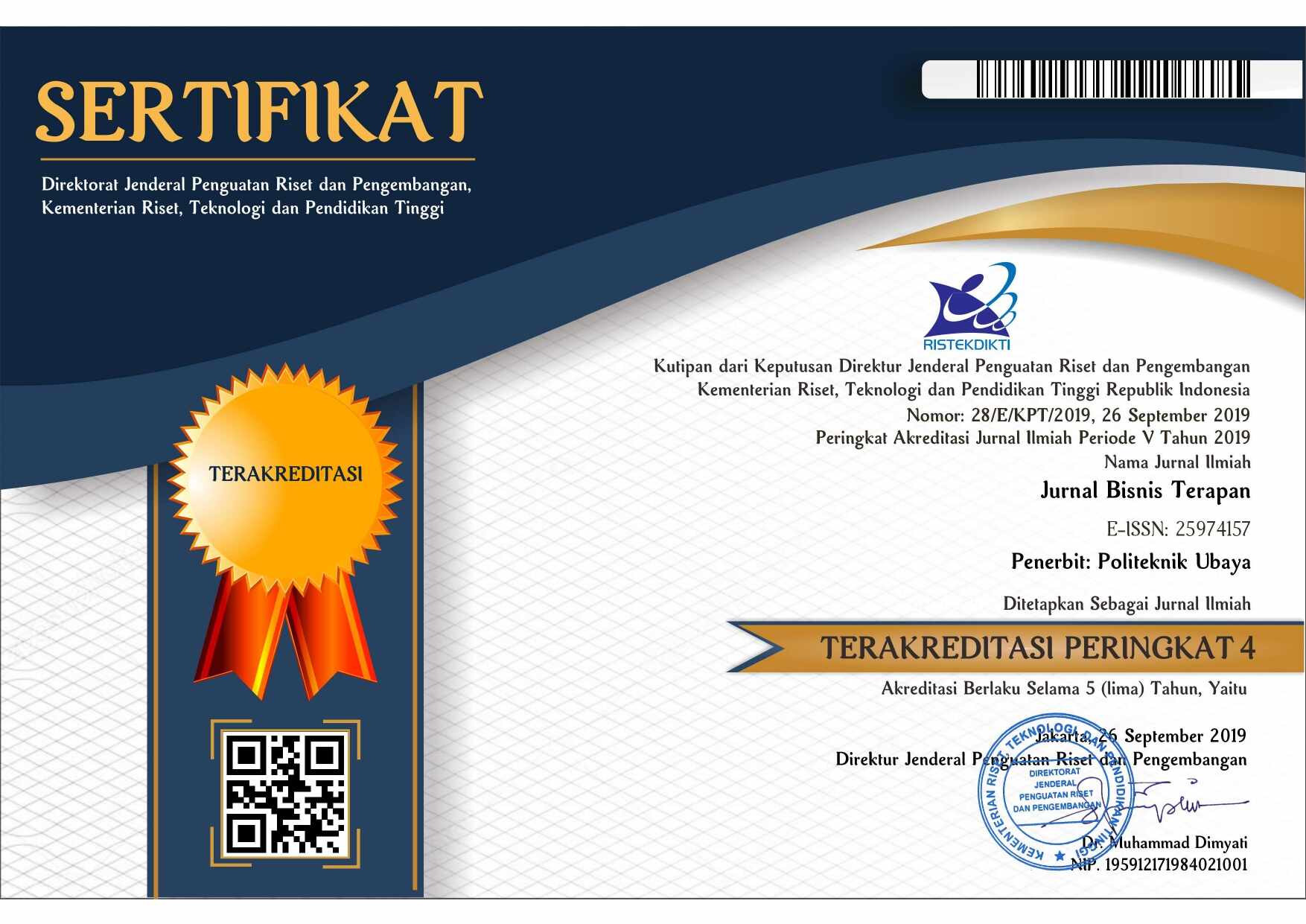ENHANCING ORGANIZATIONAL READINESS IN FACING THE ERA OF DISRUPTION WITH RESILIENCE – BASED STRATEGY
 Abstract Views:
236 times
Abstract Views:
236 times
 PDF Downloads:
191 times
PDF Downloads:
191 times
Abstract
This research is intended to identify how the organizational readiness in facing the era of disruption can enhanced, using certain strategies such as resilience- based strategies. Today's organizations are required to be resilient in facing disruption. This disruption gives birth to various risks that must be faced by businesses. Organizations are expanding their perspectives that were once only around operations and finance, now involving human resources. Therefore, it is important for organizations to understand the disruption that affect the organization and their readiness to face these risks. This research uses instruments developed by Deloitte (2023) focusing on measuring the readiness gap trends; ranging from readiness gap in a skill-based approach to readiness gap in leadership in a disrupted world. The sample of this research involving business owners and managers in Indonesia. The results show that majority of the respondents have a significant level of readiness in facing the era of disruption especially in terms of anticipating societal and environmental risk in daily business operation.
Downloads
References
Chan, C. M. L., Teoh, S. Y., Yeow, A., & Pan, G. (2019). Agility in responding to disruptive digital innovation: Case study of an SME. Information Systems Journal, 29(2), 436–455. https://doi.org/10.1111/isj.12215
Claus, L. (2019). HR disruption—Time already to reinvent talent management. BRQ Business Research Quarterly, 22(3), 207–215. https://doi.org/10.1016/j.brq.2019.04.002
Davenport, D., Alvarez, A., Natesan, S., Caldwell, M. T., Gallegos, M., Landry, A., Parsons, M., & Gottlieb, M. (2022). Faculty Recruitment, Retention, and Representation in Leadership: An Evidence-Based Guide to Best Practices for Diversity, Equity, and Inclusion from the Council of Residency Directors in Emergency Medicine. Western Journal of Emergency Medicine, 23(1), 62–71. https://doi.org/10.5811/westjem.2021.8.53754
Eliot, J. L. (2020). Resilient Leadership: The Impact of a Servant Leader on the Resilience of their Followers. Advances in Developing Human Resources, 22(4), 404–418. https://doi.org/10.1177/1523422320945237
Deloitte (2023). New fundamentals for a boundaryless world | Deloitte Insights. https://www2.deloitte.com/us/en/insights/focus/human-capital-trends/2023/future-of-workforce-management.html?id=us:2sm:3li:4di_gl:5eng:6di
Jiang, J., Ding, W., Wang, R., & Li, S. (2022). Inclusive leadership and employees’ voice behavior: A moderated mediation model. Current Psychology, 41(9), 6395–6405. https://doi.org/10.1007/s12144-020-01139-8
Joshi, B. P. (2018). Disruptive Innovation in Hospitality Human Resource. Journal of Tourism and Hospitality Education, 8, 48–61. https://doi.org/10.3126/jthe.v8i0.20010
Jun, W., Nasir, M. H., Yousaf, Z., Khattak, A., Yasir, M., Javed, A., & Shirazi, S. H. (2022). Innovation performance in digital economy: does digital platform capability, improvisation capability and organizational readiness really matter? European Journal of Innovation Management, 25(5), 1309–1327. https://doi.org/10.1108/EJIM-10-2020-0422
Khajehpour, M., Sedaghatparast, E., & Rabieh, M. (2022). Designing a comprehensive model of organizational resilience in the banking industry of Iran. Asian Journal of Economics and Banking, 6(1), 69–87. https://doi.org/10.1108/ajeb-01-2021-0011
Kominfo. (2017). Culinary, Crafts, and Fashion, Biggest Contributor to Creative Economy. In Kominfo. https://www.kominfo.go.id/content/detail/11034/kuliner-kriya-dan-fashion-penyumbang-terbesar-ekonomi-kreatif/0/berita_satker
Mercer. (2022). Global Talent Trends 2022-2023. In Mercer Global Talent Trend. https://www.mercer.com/insights/people-strategy/future-of-work/global-talent-trends/
Ngoc Su, D., Luc Tra, D., Thi Huynh, H. M., Nguyen, H. H. T., & O’Mahony, B. (2021). Enhancing resilience in the Covid-19 crisis: lessons from human resource management practices in Vietnam. Current Issues in Tourism, 24(22), 3189–3205. https://doi.org/10.1080/13683500.2020.1863930
Robertson, J., Botha, E., Walker, B., Wordsworth, R., & Balzarova, M. (2022). Fortune favours the digitally mature: the impact of digital maturity on the organisational resilience of SME retailers during COVID-19. International Journal of Retail and Distribution Management, 50(8–9), 1182–1204. https://doi.org/10.1108/IJRDM-10-2021-0514
Rosyadi, S., Kusuma, A. S., Fitrah, E., Haryanto, A., & Adawiyah, W. (2020). The Multi-Stakeholder’s Role in an Integrated Mentoring Model for SMEs in the Creative Economy Sector. SAGE Open, 10(4). https://doi.org/10.1177/2158244020963604
Selimovic, J., Pilav-Velic, A., and Krndzija, L. (2021). Digital workplace transformation in the financial service sector: Investigating the relationship between employees’ expectations and intentions. Technology in Society. https://doi.org/10.1016/j.techsoc.2021.101640
Singh, J. P., Chand, P. K., Mittal, A., & Aggarwal, A. (2020). High-performance work system and organizational citizenship behaviour at the shop floor. Benchmarking, 27(4), 1369–1398. https://doi.org/10.1108/BIJ-07-2019-0339
Sousa, M. J. and Rocha, A. (2019). Skills for disruptive digital business. Journal of Business Research. https://doi.org//10.1016/j.jbusres.2017.12.051
Tan, J. (2023). HR leaders in Indonesia prioritising talent and wellbeing. HRM Asia. https://hrmasia.com/hr-leaders-in-indonesia-prioritising-talent-and-wellbeing/
Vaishnavi, V., Suresh, M., & Dutta, P. (2019). A study on the influence of factors associated with organizational readiness for change in healthcare organizations using TISM. Benchmarking, 26(4), 1290–1313. https://doi.org/10.1108/BIJ-06-2018-0161
Yong, J. Y., Yusliza, M. Y., Ramayah, T., Chiappetta Jabbour, C. J., Sehnem, S., & Mani, V. (2020). Pathways towards sustainability in manufacturing organizations: Empirical evidence on the role of green human resource management. Business Strategy and the Environment, 29(1), 212–228. https://doi.org/10.1002/bse.2359


This work is licensed under a Creative Commons Attribution-NonCommercial-ShareAlike 4.0 International License.

Ciptaan disebarluaskan di bawah Lisensi Creative Commons Atribusi-NonKomersial-BerbagiSerupa 4.0 Internasional.
-
Articles published in Jurnal Bisnis Terapan are licensed under a Creative Commons Attribution-NonCommercial-ShareAlike 4.0 International (CC BY-NC-SA 4.0) license, which permits anyone to copy, transform, or redistribute articles for any lawful purpose in any medium, provided appropriate credit is given to the original author(s) and Jurnal Bisnis Terapan is recognized as its original publisher. A link to this license should also be provided. Any derivative work of an article published in Jurnal Bisnis Terapan must also be shared under the same (or compatible) license.
-
Both copyright and publishing rights on articles are retained by the respective author(s), without restrictions. Only a non-exclusive license is granted to Jurnal Bisnis Terapan to publish the article and identify itself as its original publisher.

 DOI:
DOI:






